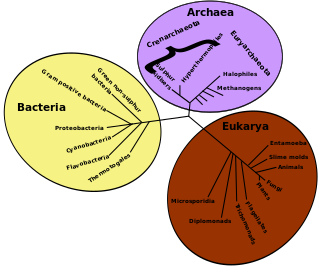Related Research Articles
Zoology is the branch of biology that studies the animal kingdom, including the structure, embryology, evolution, classification, habits, and distribution of all animals, both living and extinct, and how they interact with their ecosystems. The term is derived from Ancient Greek ζῷον, zōion ('animal'), and λόγος, logos.

Biogeography is the study of the distribution of species and ecosystems in geographic space and through geological time. Organisms and biological communities often vary in a regular fashion along geographic gradients of latitude, elevation, isolation and habitat area. Phytogeography is the branch of biogeography that studies the distribution of plants. Zoogeography is the branch that studies distribution of animals. Mycogeography is the branch that studies distribution of fungi, such as mushrooms.
The history of zoology before Charles Darwin's 1859 theory of evolution traces the organized study of the animal kingdom from ancient to modern times. Although the concept of zoology as a single coherent field arose much later, systematic study of zoology is seen in the works of Aristotle and Galen in the ancient Greco-Roman world. This work was developed in the Middle Ages by Islamic medicine and scholarship, and in turn their work was extended by European scholars such as Albertus Magnus.

Evolutionary ecology lies at the intersection of ecology and evolutionary biology. It approaches the study of ecology in a way that explicitly considers the evolutionary histories of species and the interactions between them. Conversely, it can be seen as an approach to the study of evolution that incorporates an understanding of the interactions between the species under consideration. The main subfields of evolutionary ecology are life history evolution, sociobiology, the evolution of interspecific interactions and the evolution of biodiversity and of ecological communities.
Ecology is a new science and considered as an important branch of biological science, having only become prominent during the second half of the 20th century. Ecological thought is derivative of established currents in philosophy, particularly from ethics and politics.

Douglas Joel Futuyma is an American evolutionary biologist. He is a Distinguished Professor in the Department of Ecology and Evolution at Stony Brook University in Stony Brook, New York and a Research Associate on staff at the American Museum of Natural History in New York City. His research focuses on speciation and population biology. Futuyma is the author of a widely used undergraduate textbook on evolution and is also known for his work in public outreach, particularly in advocating against creationism.

Hydrobiology is the science of life and life processes in water. Much of modern hydrobiology can be viewed as a sub-discipline of ecology but the sphere of hydrobiology includes taxonomy, economic and industrial biology, morphology, and physiology. The one distinguishing aspect is that all fields relate to aquatic organisms. Most work is related to limnology and can be divided into lotic system ecology and lentic system ecology.

George Evelyn Hutchinson, was a British ecologist sometimes described as the "father of modern ecology." He contributed for more than sixty years to the fields of limnology, systems ecology, radiation ecology, entomology, genetics, biogeochemistry, a mathematical theory of population growth, art history, philosophy, religion, and anthropology. He worked on the passage of phosphorus through lakes, the chemistry and biology of lakes, the theory of interspecific competition, and on insect taxonomy and genetics, zoo-geography and African water bugs. He is known as one of the first to combine ecology with mathematics. He became an international expert on lakes and wrote the four-volume Treatise on Limnology in 1957.

Ramon Margalef i López was a Spanish biologist and ecologist. He was Emeritus Professor of Ecology at the Faculty of Biology of the University of Barcelona. Margalef, one of the most prominent scientists that Spain has produced, worked at the Institute of Applied Biology (1946–1951), and at the Fisheries Research Institute, which he directed during 1966-1967. He created the Department of Ecology of the University of Barcelona, from where he trained a huge number of ecologists, limnologists and oceanographers. In 1967 he became Spain's first professor of ecology.

Gene Elden Likens is an American limnologist and ecologist. He co-founded the Hubbard Brook Ecosystem Study at the Hubbard Brook Experimental Forest in 1963, and founded the Cary Institute of Ecosystem Studies in Millbrook, New York in 1983.
Daniel Archibald Livingstone was the James B Duke Professor Emeritus and Research Professor, in the Department of Biology at Duke University, Durham, North Carolina. Born in Detroit, Michigan, Livingstone studied at McGill and Dalhousie Universities before joining Ed Deevey's research group as a PhD student at Yale University.
James Mallet is an evolutionary zoologist specialising in entomology.
Richard O. Prum is William Robertson Coe Professor of ornithology, and head curator of vertebrate zoology at the Peabody Museum of Natural History at Yale University.
Carla Cáceres is a professor at the University of Illinois Urbana-Champaign known for her research in population, community and evolutionary ecology, focusing on the origins, maintenance, and functional significance of biodiversity within ecosystems. She is a Fellow of the American Association for the Advancement of Science, the Ecological Society of America, and the Association for the Sciences of Limnology and Oceanography

Alan Reece Longhurst is a British-born Canadian oceanographer who invented the Longhurst-Hardy Plankton Recorder, and is widely known for his contributions to the primary scientific literature, together with his numerous monographs, most notably the "Ecological Geography of the Sea". He led an effort that produced the first estimate of global primary production in the oceans using satellite imagery, and also quantified vertical carbon flux through the planktonic ecosystem via the biological pump. More recently, he has offered a number of critical reviews of several aspects of fishery management science and climate change science.
Dame Carolyn Waugh Burns is a New Zealand ecologist specialising in lakes. She is an emeritus professor at the University of Otago.

Meghan Anne Duffy is an American biologist and associate professor of ecology and evolutionary biology at the University of Michigan. She focuses on the causes and consequences of parasitism in natural populations of lake populations. In 2019, she created a task force to examine factors that influence the mental health and well-being of graduate students at the University of Michigan.
Walles Thomas Edmondson, also known as "Tommy" amongst his peers, was a prominent professor of zoology at the University of Washington. Edmondson was also leading American limnoecologist and writer, whose research focused on the causation and effects of eutrophication by plankton and his early work on rotifer taxonomy from Hispaniola, the Himalayas and lakes across the United States.

Maciej Gliwicz is a Polish biologist, evolutionist and professor at the University of Warsaw who specializes in the field of hydrobiology.
Kathryn Linn Cottingham is a Professor of Ecology, Evolution, Environment and Society in the John Sloan Dickey Center for International Understanding at Dartmouth College. She is a Fellow of the Ecological Society of America and American Association for the Advancement of Science. From 2020 she will serve as editor-in-chief of the journal Ecology.
References
- ↑ "Obituary of Helen Beebe". Bell Tower Funeral Home. 2013. Retrieved 30 December 2018.
- ↑ Thomas E. Lovejoy (2011). "George Evelyn Hutchison 13 January 1903 — 17 May 1991 Elected for MemRS 1983". Biographical Memoirs of Fellows of the Royal Society. 57: 167–177. doi: 10.1098/rsbm.2010.0016 .
- ↑ Frank N. Egerton (2016). "Part 57: Aspects of Limnology in America, 1930s to about 1990, Led by Hutchinson and Hasler". Bulletin of the Ecological Society of America. 97 (3): 228–282. doi: 10.1002/bes2.1242 .
- 1 2 3 4 Norma Fowler (1990). "On the retirement of John Langdon Brooks from the NSF". Bulletin of the Ecological Society of America. 71 (3): 164–165. JSTOR 20167202 . Retrieved 30 December 2018.
- ↑ Joe Cain (2004). "Launching the Society of Systematic Zoology". In David M. Williams; Peter L. Forey (eds.). Milestones in Systematics. Systematics Association Special Volumes. CRC Press. ISBN 978-0203643037.
- ↑ Iain McCalman (2009). Darwin's Armada: Four Voyagers to the Southern Oceans and Their Battle for the Theory of Evolution. Simon & Schuster. ISBN 978-1847377180.
- ↑ John J. Magnuson; Timothy K. Kratz; Barbara J. Benson, eds. (2006). Long-term Dynamics of Lakes in the Landscape: Long-term Ecological Research on North Temperate Lakes. Long-Term Ecological Research Network series. Oxford University Press. ISBN 978-0195136906.
- ↑ "Search results for 'au:Brooks, John Langdon,'". WorldCat. Retrieved 30 December 2018.
- ↑ Christopher Scharpf & Kenneth J. Lazara (4 December 2018). "Order CICHLIFORMES: Family CICHLIDAE: Subfamily PSEUDOCRENILABRINAE (l-o)". The ETYFish Project Fish Name Etymology Database. Christopher Scharpf and Kenneth J. Lazara. Retrieved 30 December 2018.